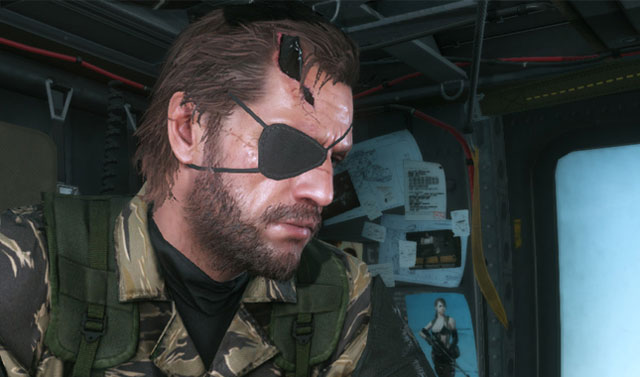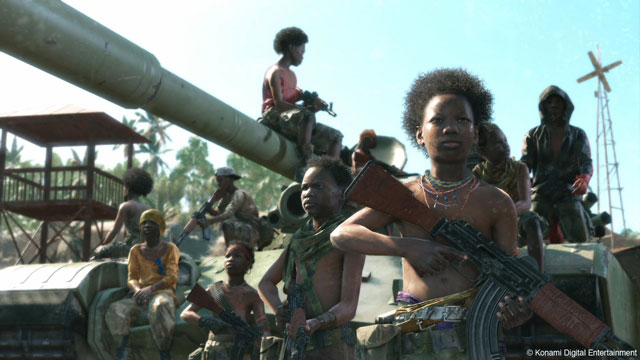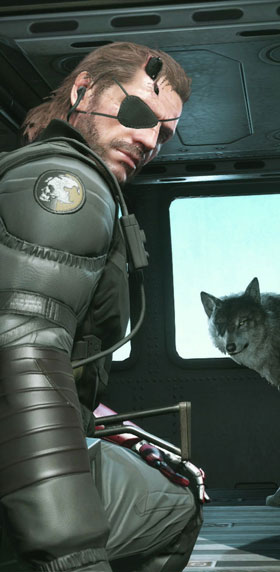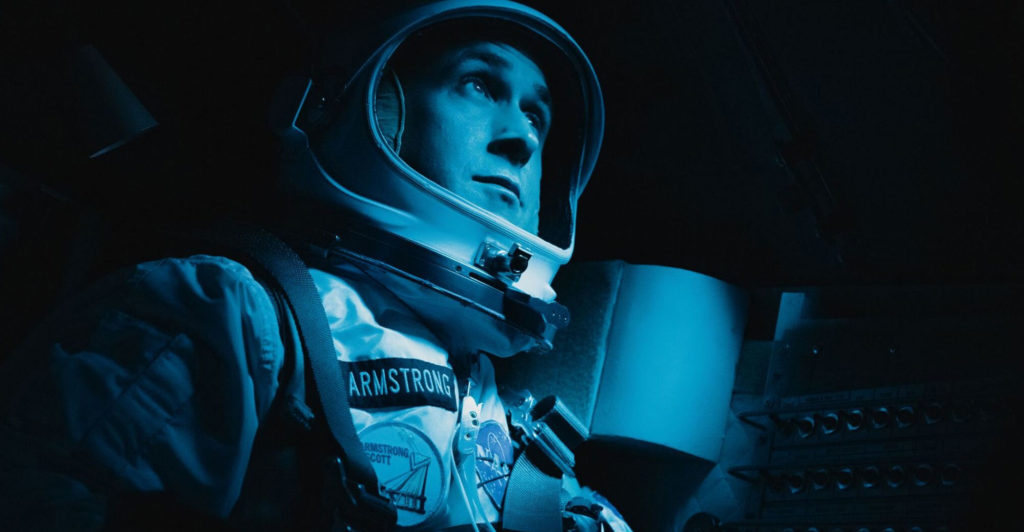
Review contains a few mild spoilers.
Metal Gear creator Hideo Kojima has, over the years, alternated between trolling his fans and pandering to them and trolling them by pandering to them. Metal Gear Solid V: The Phantom Pain might be his most intricate stunt yet, though it is disguised as a fairly routine action game for much of its running time.
Remember Metal Gear Solid 2: Sons of Liberty? Kojima angered unsuspecting players with the mid-game switcheroo of the player character, swapping gravelly-voiced super-soldier Solid Snake for the whiny, effete Raiden. That’s got nothing on some of the mischief he gets up to in MGSV, his magnum opus and probably the last game he’ll get to make in the Metal Gear universe.
For a start, Kojima replaces long-time Snake voice actor David Hayter with the probably much more expensive Keifer Sutherland — only to have to Snake stand silently in many of the cinematics as events unfold around him. The game’s signature song, Midge Ure’s cover of David Bowie’s The Man Who Sold the World, is a joke for reasons that become apparent by the ending credits.
And Kojima gifts the player with a ridiculously powerful game mechanic, only to take it away without warning when there might still be dozens of hours of gameplay to go. Why? Because he wants you to experience the phantom pain of the title — the lingering ache of a missing limb is a running theme throughout the game.
It’s in that light that the game and its shortcomings should be evaluated. Like most post-modern pranks, MGSV has a smug get-out-of-jail free card for nearly any criticism that could be levelled at it. Firing up the game, it dazzles with its mid-1980s cold war setting. It picks up with Venom Snake aka Big Boss (Solid Snake’s father) trying to rebuild his military stronghold after spending nine years in a coma in the wake of the events of MGS: Ground Zero.

After an impressive, set-piece-heavy opening, MGSV turns into a chimera, pieced together from third-person combat, a narrative told through tape recordings and cinematics, and a base management meta-game. The first of these is probably the most satisfying, confidently transplanting the third-person stealth and action of the earlier MGS games from linear levels into a more open setting.
Like most of Kojima’s MGS games, the delight comes from pushing and prodding the gameplay mechanics to see what happens. There are numerous little Easter eggs hidden throughout the game world and many cool little tricks and tools to use in pursuit of your objectives in the main missions and the side-ops. The sneaking and shooting are tight and precise, and the game does a great job of surprising you with emergent moments throughout its first chapter.
For example, if you’re fond of infiltrating enemy territories at night, it’s not long before enemy soldiers starting donning night-vision goggles. If you use smoke grenades a lot, they’ll start wearing gas masks. Later, when the game moves from Afghanistan to Zaire (listen out for the Afrikaans soldiers at this point), you’ll start encountering child soldiers, and naturally, you can’t use lethal force against them. You are able to take buddies such as a horse, dog, or the controversial sniper, Quiet, into battle with you, each offering some interesting tactical options.
 Tied into the open-world combat is a base management game. Here, you focus on gathering resources, building an army, and researching weapons and equipment. When you’re in the combat world, you can use fulton balloons to whisk soldiers, animals, vehicles and cargo to your base. This is key to developing weapons, mission intel, equipment for your buddies, air support, and other tools. If you play online, you can raid other players’ forward-operating bases for resources and soldiers while trying to protect your own from invaders.
Tied into the open-world combat is a base management game. Here, you focus on gathering resources, building an army, and researching weapons and equipment. When you’re in the combat world, you can use fulton balloons to whisk soldiers, animals, vehicles and cargo to your base. This is key to developing weapons, mission intel, equipment for your buddies, air support, and other tools. If you play online, you can raid other players’ forward-operating bases for resources and soldiers while trying to protect your own from invaders.
MGSV is much lighter on the cinematic exposition than nearly any other mainline MGS game, with relatively brief cut scenes. Most of the storytelling is done through cassette tapes that you collect in the game world and are given at key points. You can listen to them while you get on with other things and the game seldom stops for the crazy, self-indulgent cinematics for which MGS is famous.
That makes MGSV feel like an MGS game for people who like Far Cry rather than MGS. I’ve always loved the meticulous detail in Kojima’s games and the many toys he gives you to play with in the gameplay segments, but was never a fan of the lengthy cut scenes and nonsensical story, so I’m okay with that. The fourth wall-breaking wackiness, toilet humour and anime-style insanity are all still there, but they’re mostly buried in gameplay and the tapes.
The recipe works well for most of chapter one, but then repetition starts to set in. From doling out interesting mother base upgrades at a generous pace, the game starts to become a grind. Not only do you need to collect huge piles of resources to start unlocking the advanced upgrades, you often need to wait for an in-game clock to run down before they’re ready.

And to unlock the later missions and key story content, you’re going to need some of these upgrades. The only way to earn the necessary resources is to do side-ops – there are 150 of them and not nearly enough variety — and in chapter two, more difficult repeats of earlier story missions. The kick in the teeth is that the story content and concluding missions are not worth the time and effort it takes to get them. MGSV feels incomplete, and perhaps the game was rushed after Kojima fell out with publisher Konami.
By the end of MGSV, Kojima himself has given up on making the sense of the series’ convoluted timeline and plot. Instead, the ending laughs at the complicity of the fans in building the mythology around Big Boss and his children, as well as any sense of agency or hope for resolution they had. And given MGSV’s happy marriage of meaning and game mechanics — base management is a clever metaphor for the futility of the arms race — it’s tempting to see chapter two as an acidic comment on today’s videogame market.
Like The Witcher 3 or Dragon Age: Inquisition or nearly anything Ubisoft makes, MGSV drags on far too long. Unlike those, it seems a little more self-aware of that fact. The insignia on one character’s shirt – “never be game over” — feels as much of commentary on the mind-numbing repetition of today’s open-world games as it is on never-ending war stoked by the military-industrial complex.
Some critics read Jurassic World as a sharp (if accidental) jab at the escalating excesses of Hollywood blockbusters — packaged as a Hollywood blockbuster. Likewise, MGSV is a triple-A game that gazes at its own bloody, fractured reflection in the mirror. That the rising costs of large-scale game development have led to a rupture between Kojima and Konami makes it more delicious. MGSV is bloated and yet unfinished, but that makes it the perfect artefact of today’s big budget gaming market. — © 2015 NewsCentral Media
- Reviewed on PS4. Also on PC, Xbox One, PS3 and Xbox 360
- Subscribe to TechCentral’s free daily newsletter




